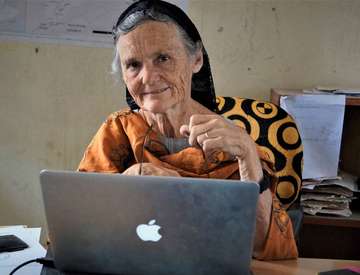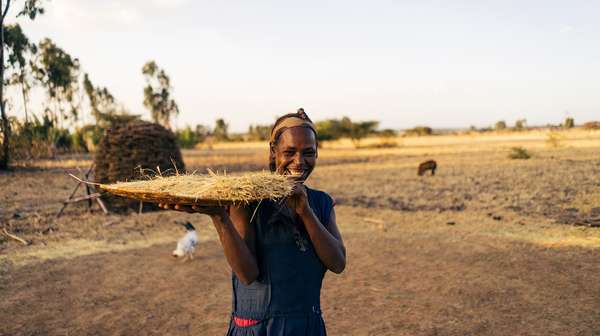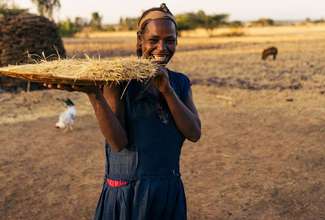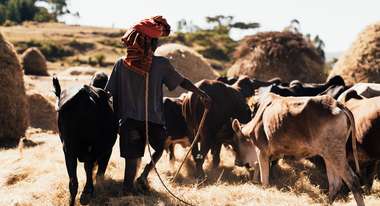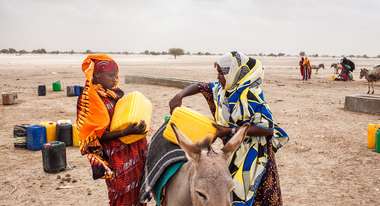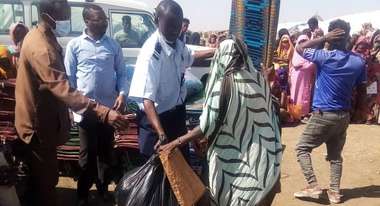Ethiopia is regularly hit by severe droughts, and the dry seasons lead to crop failures and livestock deaths - one cause of the increasing weather extremes is climate change.
Chaos Beyond Imagination
Our colleague Fasika met with the program coordinator of our partner organization APDA, Valerie Browning, to talk about the unique challenges during the conflict in north Ethiopia.
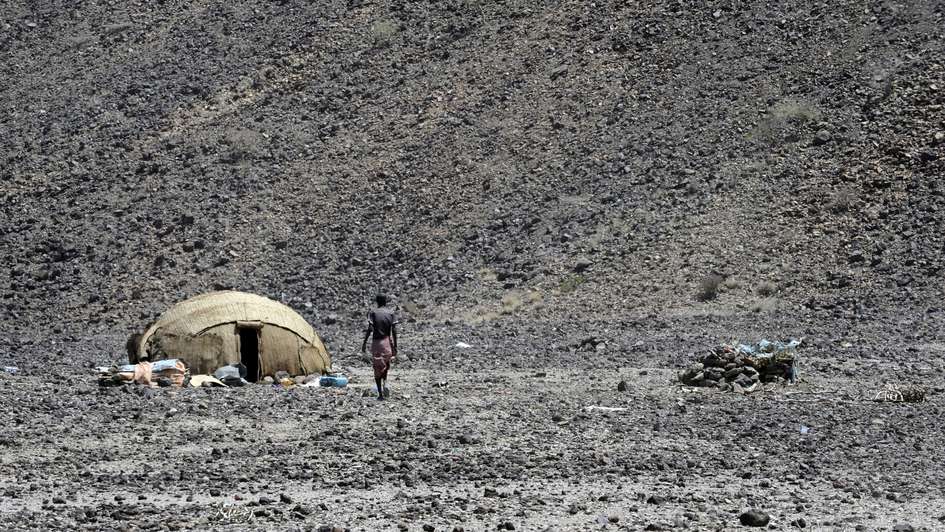
On my trip to the Afar and Amhara region in northern Ethiopia, I met Valerie Browing. The 71-year-old nurse is the program coordinator for Welthungerhilfe's partner organization, the Afar Pastoralist Development Association (APDA). She founded the organization in 1993 together with her husband Ismael Ali Gordo, an Ethiopian from the Afar region. Valerie believes that it is important to take the unique geography, climate, culture, as well as the way of life of the semi-nomadic pastoralist people into account when providing assistance. Therefore, APDA is an organization run by and for the Afar people. The partnership between Welthungerhilfe and APDA began many years ago. Today, the two organizations work together to provide life-saving emergency aid to the Afar people.
Insecurity makes access difficult for NGOs
Valerie has worked for APDA for 28 years and has witnessed a lot in that time. She has worked during droughts, floods and cholera outbreaks in the region, but the current conflict and the chaos it has brought are beyond her comprehension. "The IDPs who have left their villages for fear of their lives are currently living in a miserable situation. They found shelter in schools, warehouses or even under trees, and most of them have very little or nothing to eat," she explains.
The government and NGOs are simply overwhelmed with the number of IDPs, and people often cannot be adequately cared for as a result. Additionally, there are IDPs in hard-to-reach, rural areas that are in the worst possible situation, according to Valerie. "Because of the insecurity in these areas in Daboore Kebelle in Afedera Woreda, most NGOs do not dare to go there. There are signs of malnutrition in these areas. For example, in Daboore Kebelle in Afedera Woreda, where 43,000 IDPs from the Berhale zone are sheltering under trees and waiting for help," she underlines.
According to reports, 67,000 people are isolated in Konnaba, Dallol, which has been partially captured by the TPLF. These people are living in heat of just below 50 degrees, have little access to water, and are suffering from food shortages. On March 21, APDA sent two food trucks to the area; unfortunately, they were only able to reach 1100 people, just a fraction of those in need of assistance. Valerie recalls the things she had to see on her trip to the area. "I saw a mother giving birth under a tree. This is not a rarity. We estimate that in this area alone, more than 50 women have had to give birth to their babies without any medical care and in poor sanitary conditions. This is completely unacceptable and must end," she said.
Weakened markets worsen the situation
Another problem that seriously affects communities in Afar is the weakening of local markets. This includes the lack of grinding mills. This further exacerbates the situation for IDPs. "The IDPs receive food aid mostly in the form of whole grain products such as wheat, barley and rice. Most of these people have left everything behind, including their cooking utensils. We need to build mills in strategic areas so they can make flour from the whole grains and easily prepare the food. We need to revive the local market, and quickly, to prevent malnutrition," Valerie added. Another challenge in providing help to the IDPs in rural areas is the lack of truck drivers to transport the food. Truck drivers are afraid to drive into these areas. APDA has already lost two of its trucks to TPLF in Magaala.
Welthungerhilfe, together with its partner APDA, focuses on the needs of local communities when implementing emergency relief programs. "Together we have established a team on the ground to address health, hygiene, and poor nutrition. We need to strengthen and expand our engagement in remote areas where people are inaccessible to other NGOs. We also need to provide food to these people," Valerie said.
Valerie is concerned that the situation in Afar is not being adequately represented in both the humanitarian and political arenas. If the conflict does not end immediately, Valerie fears that the worst is yet to come.
Welthungerhilfe’s Response in Afar and Amhara
In Afar, Welthungerhilfe is working with our partner, the Afar Pastoralist Development Association (APDA), in response to growing humanitarian needs. In 2022, APDA and Welthungerhilfe have already provided food (wheat flour, oil, lentils and salt) to 10,000 people affected by the ongoing conflict in the border areas between Afar and Tigray. IDPs and recent returnees in 10 kebeles (villages) and the district capital, where most IDPs and returnees in the district are located, were selected. In addition, emergency shelters, hygiene kits and facilities were organized, along with camp coordination and livelihood restoration activities that reached more than 100,000 people affected by the crisis.
In Amhara, Welthungerhilfe and its partners AISDA and ORDA have distributed bed and kitchen sets as well as WASH items such as sinks, jerry cans and jugs to more than 10,000 people in the region. In addition, Welthungerhilfe is working with its partner ORDA on emergency relief efforts focused on shelter, hygiene and livelihood restoration. These are expected to reach more than 50,000 people affected by the crisis.





